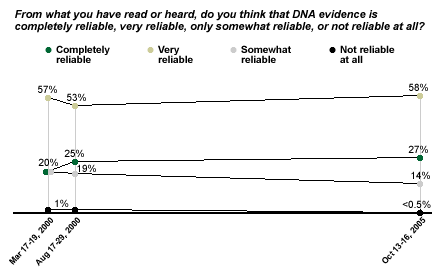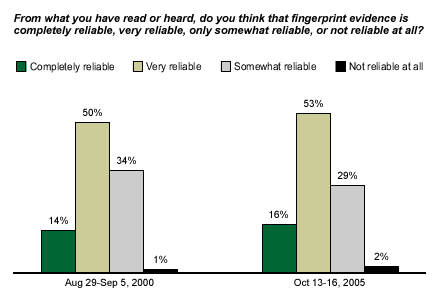Via high-profile criminal trials and popular television crime dramas, Americans are learning a single strand of hair, a swab of saliva, or a drop of blood can mean the difference between a prison cell and freedom. The use of DNA evidence has changed the criminal justice system more than anything else in recent history --prosecutors have used it to convict and it has exonerated convicted felons. Gallup's recent update of its annual crime survey* indicates Americans are highly confident in the reliability of DNA evidence, especially relative to their confidence in fingerprint evidence.
Majority Considers DNA Evidence Reliable
More than 8 in 10 Americans (85%) think DNA evidence is either completely (27%) or very (58%) reliable. A majority considered it reliable when Gallup first asked the question in 2000; the percentage backing the reliability of DNA has increased since then.

As might be expected of a relatively new scientific development, public opinion of DNA evidence's reliability varies slightly among Americans who have at least some college education and those who have a high school education or less. Eighty-nine percent of those with at least some college say DNA evidence is completely (30%) or very (59%) reliable, compared with 79% of those with high school educations or less (22% completely reliable, 57% very reliable).
Leaving Fingerprints?
Fingerprint evidence has been used to link suspects to crimes for more than 100 years. Fingerprints are also unique identifiers, but unlike DNA, they are subject to complicating factors such as smudges and partial imprints. A majority of Americans consider fingerprint evidence reliable, but not as many as say the same about DNA evidence -- 69% say fingerprints are completely (16%) or very (53%) reliable. Again, as with DNA evidence, the public's belief in the reliability of fingerprint evidence has increased since the question was last asked in 2000.

*These results are based on telephone interviews with a randomly selected national sample of 1,012 adults, aged 18 and older, conducted Oct. 13-16, 2005. For results based on this sample, one can say with 95% confidence that the maximum error attributable to sampling and other random effects is ±3 percentage points. In addition to sampling error, question wording and practical difficulties in conducting surveys can introduce error or bias into the findings of public opinion polls.
